The nutrition gap: how to bridge it
We all want the best for our children. We want them to flourish and thrive in all areas of life. Part of this process includes feeding them the most nutritionally dense diet available. But, even with our best intentions, it can be hard to provide children with everything they need. Our children are so vulnerable to nutrient deficiencies, and good nutrition influences everything from their attention span to their allergy risk.
Here, we explore the concept of the nutrition gap – the inevitable difference between what we feed our children and what they need to be optimally well, and how you can help your children to bridge this gap, today.
What is the nutrition gap?
When we meet these, our children have the best possible chance to be both physically and mentally well. Of course, we need to ensure our children get enough movement, good quality sleep and social contact, but without the key ingredient of good nutrition, each area of their health and development can suffer. In an ideal world our children would consume pure, organic, locally grown and in season food, breathe fresh air, drink fresh water and live low stress, low toxin lives.
But we do not live in an ideal world. We live in a world where soil nutrient depletion has rendered our vegetables and fruits unhelpfully low in key minerals such as magnesium and zinc. We also live in a world where traces of medications taint our water supplies, stress is an unavoidable part of life, and toxins are all around us. These factors both increase our children’s nutrient needs, whilst reducing their ability to meet them.
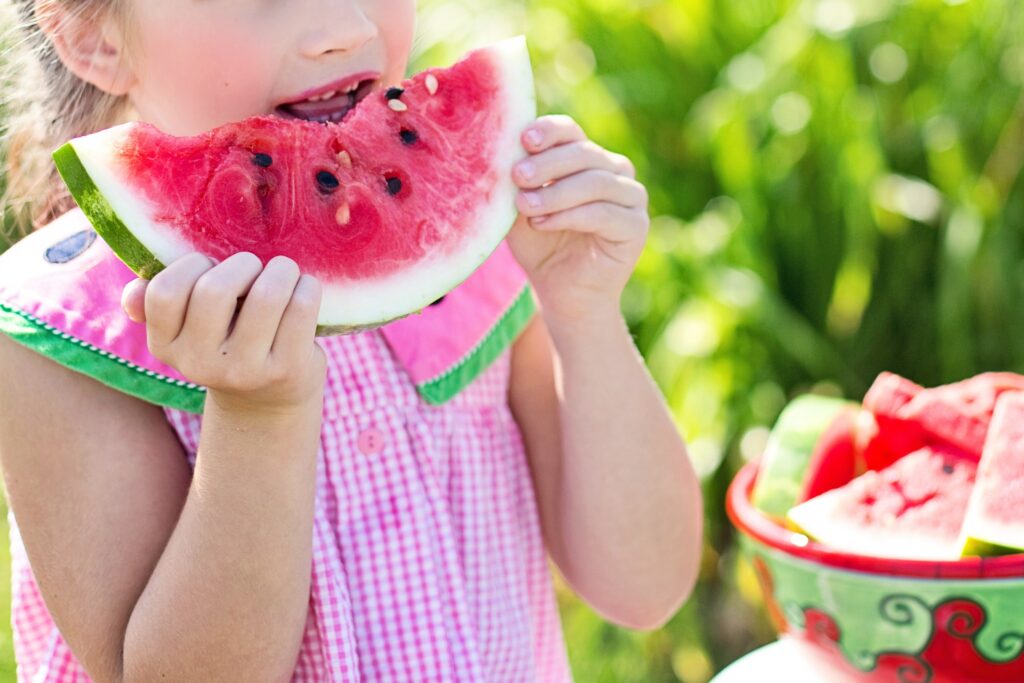
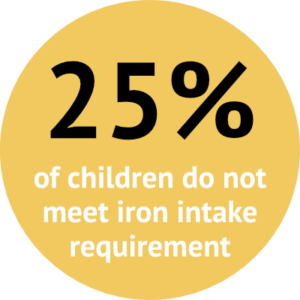
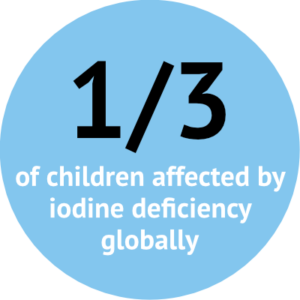
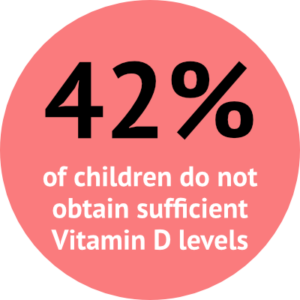
The state of our children’s health today
Sadly, this reality is reflected in the level of nutrient deficiencies our young one’s experience:
Up to 25% of children do not meet their requirements for Iron
Iodine deficiency effects around a 1/3rd of children worldwide
Up to 42% of children do not obtain sufficient Vitamin D levels
Vegetarian children typically have 50% lower calcium levels than omnivores
What do these deficiencies mean for our children?
Having key nutrient deficiencies during any stage of childhood can have severe ramifications, not just during their time as children, but also for their health risks throughout life.
It is important to remember that it is not the avoidance of deficiency which matters- there is often a big difference between the minimum amount of a nutrient required to avoid a true deficiency and the amount needed for optimum health.
Here are just a few ways that a sub optimal nutrient intake can affect our children:
Impared immune response
Our children’s immune systems are still evolving and learning to distinguish and overcome the wide range of pathogens they are exposed to on a daily basis. Key nutrients such as Zinc, Vitamin C and A are all required for the healthy development of immune T cells, which are involved in the identification and removal of harmful viruses and bacteria.
If a child remains depleted in immune supportive nutrients, they may be at a risk of autoimmunity in later life, so it is definitely worth addressing this as early as possible.
Cognitive function
Key nutrients such as iron and iodine are essential for the healthy development of our children’s brains. Not only is iron required for normal brain structure, but it also plays a role in emotional regulation and the ability to remember things. Iodine is also key for brain functionality, and when depleted, can adversely impact a child’s IQ.
Gut health
When our child is lacking in a diverse range of beneficial plant fibres, is exposed to antibiotics or other medications at an early age, or isn’t breastfed, they can experience a form of dysbiosis- which is an imbalance in the gut microbiome (the trillions of bugs housed in our large intestines). Our modern diets often lack in fibre, and sometimes children are not keen on eating enough of the type of plants required for good gut health. Probiotics become a useful aspect of redressing this balance.
Sleep and stress
Our children are increasingly vulnerable to the impact of stress on their health and wellbeing. With increased screen time, exposure to frightening world news, and the pressure to keep up at school, it is no wonder that children sometimes have a hard time winding down or nodding off. When we combine these factors with a depletion in key minerals such as magnesium and essential fatty acids such as omega 3, our children can also be exposed to a greater risk of ADHD and anxiety disorders.
How can we bridge the gap?
We can firstly maximise the nutritional density of the diets we feed our children. This can be easily achieved by the prioritisation of real whole foods.
By choosing an abundant and diverse range of fresh, natural, and where possible organic fruits and vegetables we can provide our children with the range of different plant fibres their gut needs to function well.
By including many different herbs, wholegrains, lean proteins, and healthy fats, we can support their hormonal health, reduce inflammation, and ensure they get a wide range of antioxidants and natural plant-based goodness.
We can also aim to reduce our children’s exposure to plastics, harsh cleaning products and other toxins which can affect their nutrient need.
Finally, and most importantly, we can utilise the help of a comprehensive, child specific, multi nutrient supplement.
Many supplements aimed at children are full of sugar, additives and unnatural synthetic ingredients which can be more of a harm than a help.
This is exactly why we have formulated an all-natural and plant based, nutrient dense supplement to ‘bridge the gap’ and make sure your child isn’t lacking in anything they need.
We have combined core nutrients such as Vitamin D, A, C and B with minerals including Magnesium and Iron. In addition, we have added a special probiotic blend featuring immune supportive Lactospore species.
This way, you will be giving your child exactly what they need without the stuff that they don’t – just as nature intended.
Learn more about our all-natural multi nutrient mix, Smoothie, here.
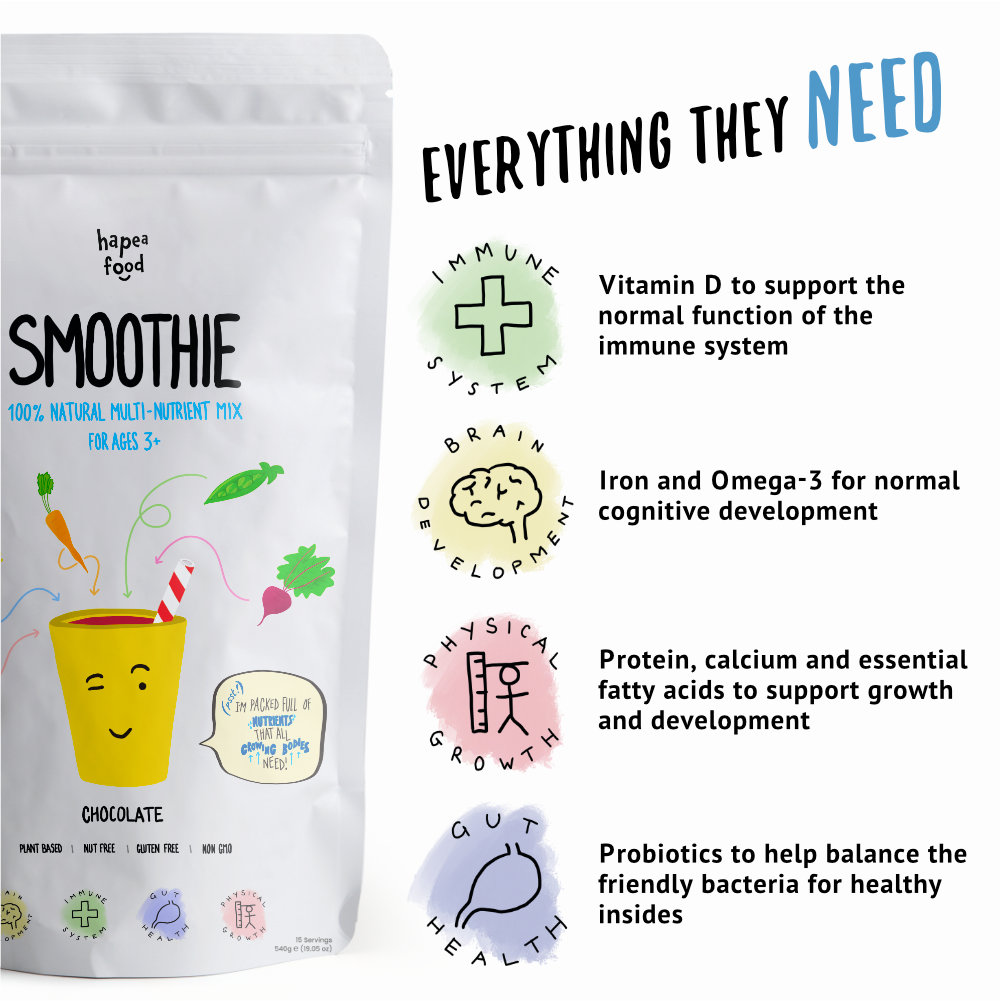
Key takeaways
Even with a healthy diet, it is hard for our children to get everything they need to be optimally well- this is known as the ‘nutrition gap’
Our children have a specific need for nutrients such as Iron, Iodine, Vitamin D and Magnesium; deficiencies can affect brain function, immune system and gut health
We can ‘close the gap’ by focusing on nutrient density and consuming a comprehensive child focused supplement.

Julia Ebbens (RN)
Julia Ebbens is a Registered Nutritionist with an MSc in Nutritional Medicine, who has worked as a Nutritionist and Health coach for the NHS and private health sector in the UK, as well as a health educator.
References
1 Rudloff S, Bührer C, Jochum F, et al. Vegetarian diets in childhood and adolescence. Mol Cell Pediatr. 2019. doi:10.1186/s40348-019-0091-z
2 Hibbeln JR, Davis JM, Steer C, et al. Maternal seafood consumption in pregnancy and neurodevelopmental outcomes in childhood (ALSPAC study): an observational cohort study. Lancet. 2007. doi:10.1016/S0140-6736(07)60277-3
3 Schwarzenberg SJ, Georgieff MK. Advocacy for improving nutrition in the first 1000 days to support childhood development and adult health. Pediatrics. 2018. doi:10.1542/peds.2017-3716
4Gombart AF, Pierre A, Maggini S. A review of micronutrients and the immune system–working in harmony to reduce the risk of infection. Nutrients. 2020. doi:10.3390/nu12010236
5 Mahajan G, Sikka M, Rusia U, Bhatia MS. Iron profile in children with behavioural disorders: A prospective study in a tertiary care hospital in North India. Indian J Hematol Blood Transfus. 2011. doi:10.1007/s12288-011-0061-7
6 Bougma K, Aboud FE, Harding KB, Marquis GS. Iodine and mental development of children 5 years old and under: A systematic review and meta-analysis. Nutrients. 2013. doi:10.3390/nu5041384
